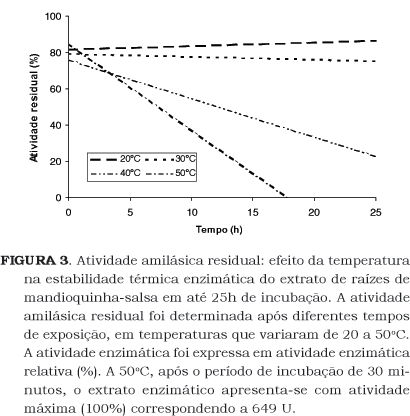This investigation was undertaken to characterize amylases from Peruvian carrot (Arracacia xanthorrhiza Bancroft.). Activity assays were performed in different changing pHs, temperatures, time and cation concentrations. PAGE zymograms and the amylase activity essays were detected by starch-iodine complex. The results showed that Peruvian carrot has three amylase components on the crude extract. The enzymes had optimum pH at 6.0. Amylases were more sensitive to basic pH when the pre-incubation occured at 50oC. The best activation temperature occurred at 50oC, whereas at 70oC the amylase activity was reduced by 80%. Assays of thermal stability at 20 and 30oC showed that amylases could maintain high activity following 25 hours of exposure at those temperatures. At higher temperatures, 60 and 70oC, enzymatic inactivation occurred after 60 and 25 minutes, respectively. Km, Vmax and activation energy value were 0.41mg/mL, 1.11mg/mL/min and 7.53kcal/mol, respectively. The presence of Ca+2 or Mg+2 ions increased the amylase activity whereas Cu+2 decreased it. In spite of the rather low amylase activity detected, the enzymes showed high resistance and thermal stability.
peruvian carrot; Arracacia xanthorriza; alpha-amylase; beta-amylase; enzyme characterization









